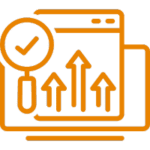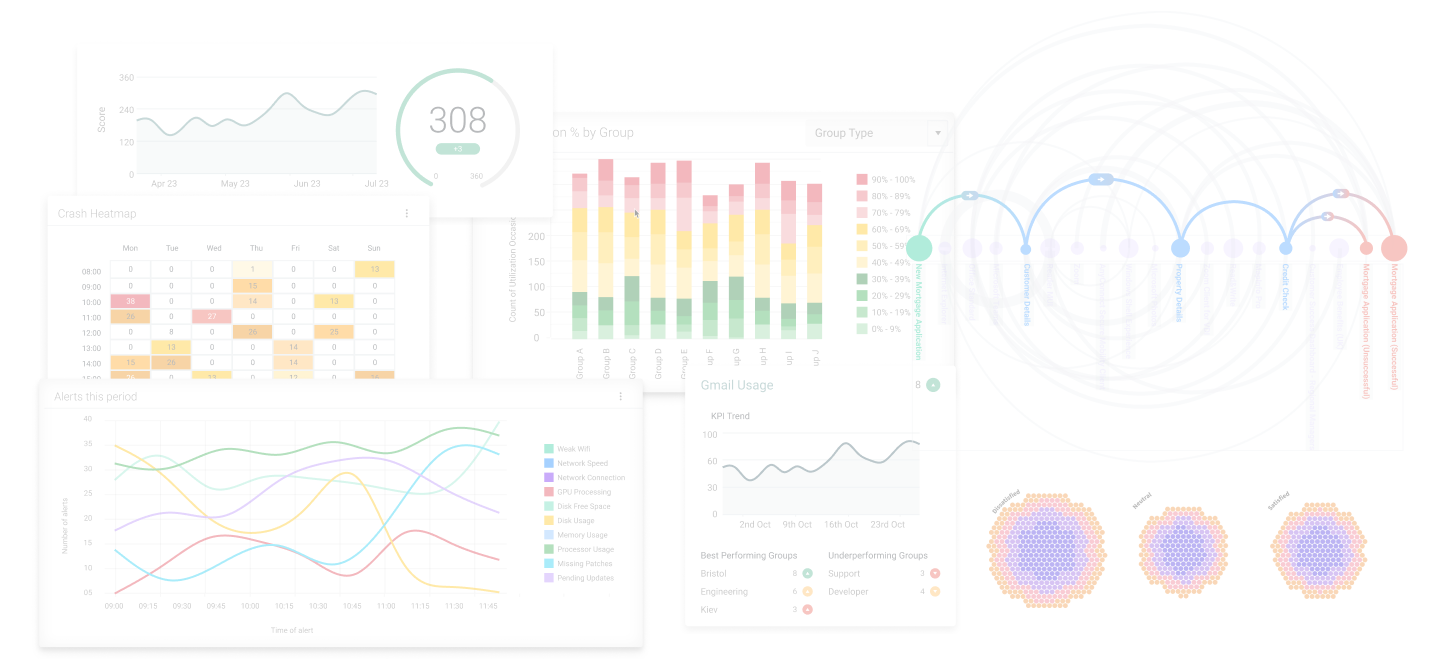The Challenge
This service company faced a significant challenge in transitioning to a hybrid work model for its diverse workforce and balancing office and remote work. Ensuring effective collaboration, creativity, and satisfaction posed key hurdles. Successfully addressing these challenges was crucial for a seamless and productive transition.
The Solution
To tackle hybrid work challenges, the company chose Acumen’s workforce analytics, which monitors IT services, assesses collaboration, and ensures employee well-being. Acumen uniquely emphasizes the human aspects of hybrid work, aligning well-being with IT effectiveness, providing valuable insights into the company’s creative and innovative capabilities.

The Results
Acumen empowered the company’s remote work transition, improving collaboration methods and supporting employee well-being by managing working hours and preventing isolation. The data-driven approach also identified tasks suited for face-to-face interaction, enhancing efficiency and innovation in a confident embrace of hybrid working.
Challenge
This service company has a diverse workforce, including many knowledge workers. It decided to move to a hybrid working model, where most people work in the office for a couple of days a week and from home the rest of the time.
Others will follow more traditional working patterns, with some administrators working full-time in the office. The nature of this business makes it crucial to get hybrid working right. Success depends on the creativity and innovativeness of the workforce, which is difficult to measure even without home working. A big attraction of home working is that hours can be more flexible to enable a better work-life balance.
For example, one employee might start work early in the morning and finish late in the evening, but take breaks for the school run and for a visit to the gym. Another might prefer a more traditional schedule and do most of their work between 9am and 5pm. The company must therefore provide tools that enable effective collaboration when members of a team are working to different timetables. It also needs to support managers by providing additional tools to demonstrate that the collaboration tools are working satisfactorily for all team members.
In contrast, teams in customer-facing roles must maintain normal office hours even when working from home. The company needs to provide tools that empower them to work effectively despite interruptions in the home environment. It must also equip managers to assess whether these tools are doing their job, and whether the teams are collaborating effectively and happily.
Solution
More than ever, this company must give staff and managers the right tools for the job. Hybrid workers require collaboration tooling that can work equally well anywhere. Managers require tools for measuring effectiveness and, in particular, for monitoring wellbeing – something that is critical to the success of hybrid working.
This company selected Scalable’s Acumen workforce analytics to help it meet the challenges of hybrid working. Acumen enables managers to monitor IT services, ensuring their availability in all working environments; to evaluate the effectiveness of collaboration and teamwork; and to check that people are happy, healthy and productive. In contrast with other workforce analytics products, Acumen focuses on the human aspects of hybrid working, and enables management to maximize wellbeing just as much as IT effectiveness.
Scalable recognizes the importance of the employee experience and that an organization can’t succeed if its employees feel frustrated much of the time. In addition, Acumen can relate its findings to business strategy. The company realized that, as a result of these capabilities, Acumen could give it a much more comprehensive view of its creative and innovative capabilities than other superficially similar products.
Results
With Acumen, the company can ensure that workers are as effective and empowered as possible, regardless of working patterns and location. Managers can see at a glance when a particular team is relying on a cumbersome collaborative method such as email.
They can then provide guidance on moving to a more effective platform such as Teams. The company is also making the most of Acumen’s ability to support employee wellbeing. It’s identified that some knowledge workers are working excessively long hours – something that isn’t always obvious with home working. The company is helping these employees to plan their time better, reducing the risk of burnout and loss of talent.
Similarly, by monitoring use of collaborative platforms, the company identified that some individuals had started to become isolated – a known pitfall for knowledge workers. Managers have intervened to promote a more collaborative approach, enhancing both wellbeing and business outcomes. Remote working is not ideal for every task, and information from Acumen is helping to identify those tasks that really benefit from face-to-face contact. These are then scheduled for days when teams are together in the office.
With Acumen, the company can readily understand and measure the effects of the new working paradigm on its processes and procedures. Acumen collects the necessary indicators automatically, and presents them in a manager-friendly format, management can look after each segment of the workforce – knowledge workers, administrators, and so on – in the most appropriate way, with little overhead. As a result, the company is confident that hybrid working is enhancing its innovative and creative capabilities, while giving its staff an exceptional working experience.

Want to see how Acumen can help your organization?
Contact our team for a personalized demo to view our DEX platform Acumen, in action.

